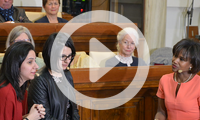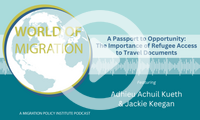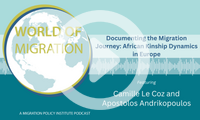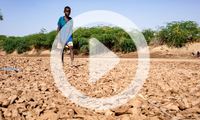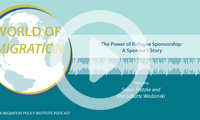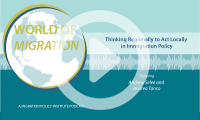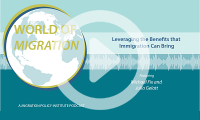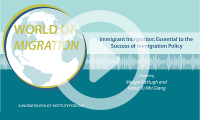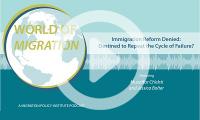Multimedia
Impacts of Extreme Heat: Global Warming and Migration
With migration a dynamic phenomenon in the Americas, the U.S. government increasingly is realizing that migration management should be viewed in a regional context. This requires a new set of policies and ways of engagement with countries in North and Central America, and beyond, as MPI President Andrew Selee discusses with colleague Andrea Tanco in this episode of our World of Migration podcast.
MPI’s 20th Anniversary Conference featured the Director-General of the International Organization for Migration, António Vitorino, in an armchair conversation with MPI co-founder and President Emeritus Demetrios G. Papademetriou, as well as a panel discussion with UN High Commissioner for Refugees Filippo Grandi and MPI co-founder Kathleen Newland and KIND President Wendy Young.
In this World of Migration podcast episode, MPI Senior Fellow Michael Fix speaks with Senior Policy Analyst Julia Gelatt about the fiscal impacts of immigration, the importance of immigrant integration, how a greater focus on credential recognition could allow immigrants to more fully utilize the academic and professional skills they bring with them, and much more.
One out of four U.S. children has an immigrant parent. On this webinar, speakers explore the intersections between the immigration and child welfare systems, along with promising state and local practices that child welfare agencies can take to improve their responsiveness to the needs of these families and promote the well-being of these children.
As MPI celebrates two decades of providing essential research, policy analysis, and data on important immigration and immigrant integration issues, hear from members of the MPI community about what the institute has meant to them and how it has evolved.
In this World of Migration podcast episode, Margie McHugh, director of MPI’s National Center on Immigrant Integration Policy, chats with Ivana Tú Nhi Giang about the important role of integration, for immigrants themselves and the broader society, and the varying degrees of intentionality in integration policy design around the world.
This webinar examines how the pandemic upended school life, the challenges for high school English Learners (ELs), state- and district-level efforts that can help ELs recover academically and address mental health needs, and the results of new research on the postsecondary aspirations of immigrant-background Latina/o students following the pandemic.
The architecture of the U.S. legal immigration system rests on a 1965 law and was last significantly updated in 1990. While there is widespread agreement that the existing framework does not align with the needs and realities of the 21st century, Congress has proven unable to enact significant legislative reform over the past two decades. How have debates on immigration changed and is achieving bipartisan consensus on this highly charged issue possible today?



